
Achieving financial success is a goal many people strive for, and the right resources can greatly influence how you approach building wealth. Whether you’re at the start of your financial journey or seeking to improve your strategies, these recommended books offer a wealth of knowledge from experienced individuals who have navigated the path to financial independence.
Key Takeaways
- Mindset Matters: A common theme among these books is the emphasis on developing a wealth-focused mindset. Whether it’s adopting the thinking patterns of millionaires, practising mindfulness in business, or understanding your subconscious financial behaviours, shifting your mindset is crucial for success.
- Practical Financial Strategies: Titles like MONEY Master The Game and The Simple Path to Wealth provide practical, step-by-step guidance for achieving financial independence. These books break down investment strategies and wealth planning that can be applied regardless of your current income level.
- Entrepreneurial Insights: Books such as Rich Dad Poor Dad and The Millionaire Fastlane highlight the entrepreneurial path to wealth, urging readers to think beyond traditional employment. They stress the importance of identifying market needs and solving problems to unlock new opportunities for financial growth.
About Arcadia Finance
Easily Secure Your Loan with Arcadia Finance – No Application Fees, 19 Trusted Lenders, and Full Compliance with South Africa’s National Credit Regulator.
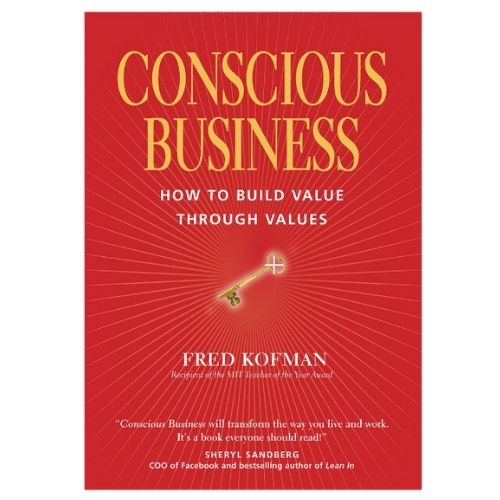
Conscious Business by Fred Kofman
“Happiness cannot be attained by wanting to be happy—it must come as the unintended consequence of working for a goal greater than oneself.”
In a recent interview with The New York Times, Sheryl Sandberg, the former COO of Facebook, expressed her support for the book Conscious Business. This book advocates for a more mindful approach to professional life, highlighting the significance of recognizing challenges and understanding the needs of colleagues. It emphasizes fostering effective communication and decision-making processes in the workplace.
Conscious Business also encourages readers to engage in self-reflection, prompting them to explore their identity and purpose. By cultivating this awareness, individuals are encouraged to integrate their insights into their work environment, ultimately leading to a more conscious and fulfilling professional experience. Sandberg’s endorsement underscores the growing recognition of mindfulness in the corporate world as a key component of success and well-being.
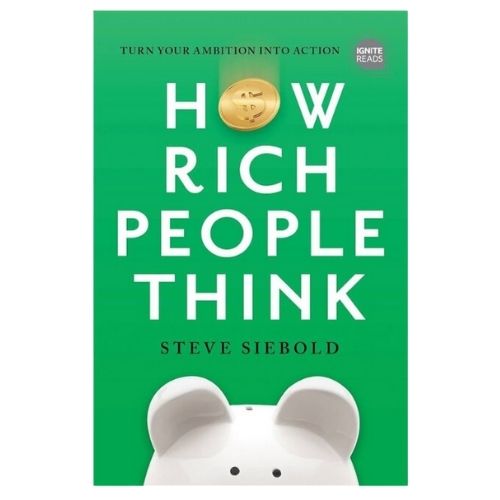
How Rich People Think by Steve Siebold
“Middle-class believes hard work creates wealth. The world-class believes leverage creates wealth.“
Have you ever wondered what drives the mindset of wealthy individuals? Steve Siebold took it upon himself to conduct interviews with hundreds of millionaires to uncover the principles that shape their way of thinking. In his work, he shares these valuable insights with the public, encouraging readers to delve deeply into the ideas that influence financial success.
By familiarizing yourself with the mindset of millionaires, you can adopt and replicate these practices in your own life. Siebold’s findings serve as a guide for anyone looking to enhance their financial outlook. By applying these millionaire principles, you may discover new pathways to financial success and unlock your potential for wealth.
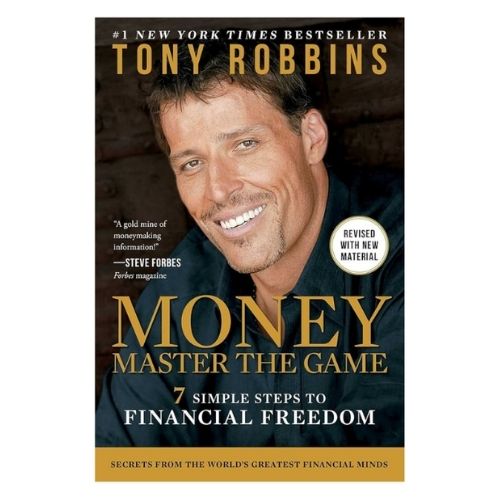
MONEY Master The Game by Tony Robbins
“Remember: we all get what we tolerate.”
MONEY Master the Game provides thorough guidance for individuals across all income levels, outlining the essential steps necessary to achieve financial independence through a structured lifelong income plan. The book offers practical insights and strategies that empower readers to take control of their financial situations, making it an invaluable resource for those looking to enhance their financial well-being.
Authored by Tony Robbins, known for his bestselling works Awaken the Giant Within and Unlimited Power, this book introduces a 7-step framework aimed at helping individuals attain financial freedom. Through this framework, Robbins equips readers with the tools and knowledge needed to navigate their financial journeys effectively.
Continue your journey to financial mastery with our recommended list of financial education books. Complementing your top book picks, these selections will broaden your understanding of complex financial concepts and equip you with the knowledge to make smarter investment decisions.
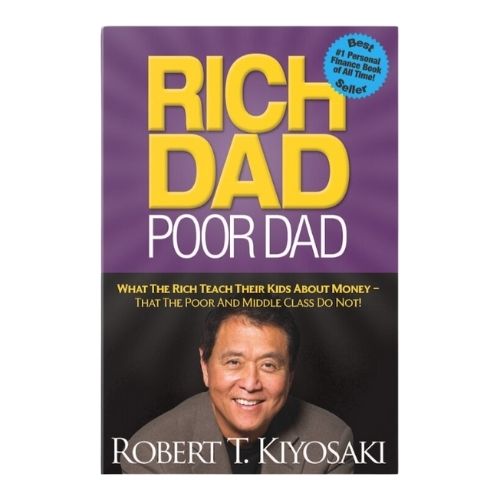
Rich Dad Poor Dad by Robert Kiyosaki
“The poor and the middle class work for money. The rich have money work for them.”
Rich Dad Poor Dad, authored by Robert Kiyosaki, is often regarded as the most popular personal finance book of all time. It contrasts the experiences of two father figures in Kiyosaki’s life. His biological father, referred to as his “poor dad,” was well-educated and dedicated his career to traditional employment. In contrast, his “rich dad,” the father of his best friend and a significant mentor to Kiyosaki, embraced practical, street-smart knowledge over formal education and chose the entrepreneurial path, ultimately becoming one of the wealthiest individuals in Hawaii.
The differing perspectives of these two men regarding money, investing, and employment had a profound impact on Kiyosaki’s own views on financial success. This book encourages readers to rethink conventional beliefs about wealth and financial literacy, highlighting the importance of financial education and entrepreneurial thinking.
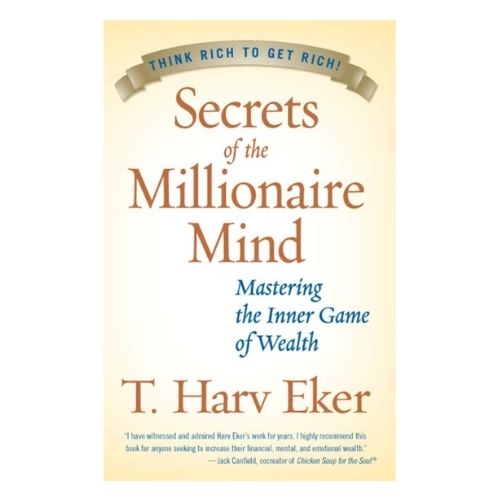
Secrets of the Millionaire Mind by T. Harv Eker
“Your income can grow only to the extent that you do.”
In his acclaimed book Secrets of the Millionaire Mind, T. Harv Eker posits that he can predict an individual’s financial future in just five minutes. He introduces the concept of a “money and success blueprint,” which refers to the personal financial blueprint ingrained in each person’s subconscious. This blueprint significantly influences one’s financial trajectory.
Eker argues that no matter how much knowledge you possess in areas like marketing, sales, investing, or real estate, if your financial blueprint isn’t aligned for success, building substantial wealth will be challenging. Even if one does acquire considerable wealth, it is likely to be lost if the underlying mindset is not geared toward sustainable prosperity. The encouraging aspect of Eker’s message is that this financial blueprint can be changed, enabling individuals to achieve more consistent and natural financial success.
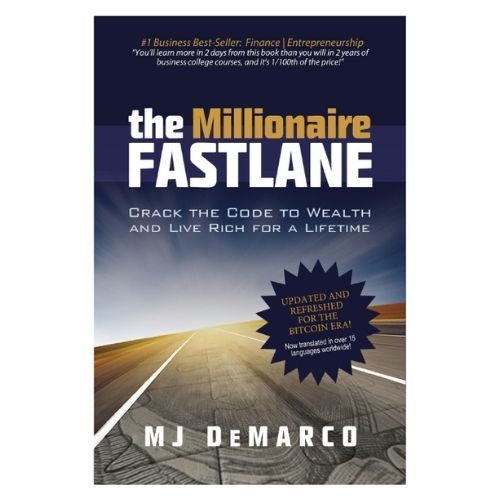
The Millionaire Fastlane by M.J. DeMarco
“Riches in your 20s make you a rockstar. Riches in your 60s make you a retiree.”
In his book, The Millionaire Fastlane, author M.J. DeMarco contrasts two approaches to wealth-building: “The Slowlane” and “The Fastlane.” The Slowlane represents a traditional route to financial security, often resulting in delayed wealth accumulation, typically seen in conventional careers and saving methods. In contrast, The Fastlane advocates for strategies that facilitate achieving significant wealth at an earlier stage in life.
DeMarco emphasizes that wealth creation revolves around identifying a demand in the market and effectively providing solutions to meet that need. This approach is particularly appealing to those who enjoy problem-solving and possess an entrepreneurial mindset, as it encourages innovative thinking and proactive engagement in wealth-building activities.
The ultimate goal of getting rich for many is to achieve financial independence. Know how much money you need to stop working to retire early and live off your investments, echoing the financial independence themes found in several top books on wealth building.
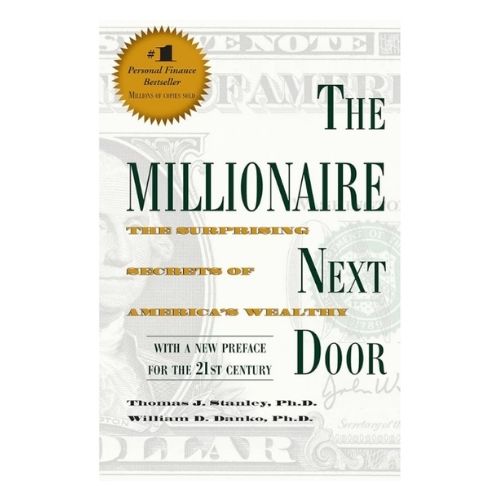
The Millionaire Next Door by Thomas J. Stanley and William D. Danko
“Many people who live in expensive homes and drive luxury cars do not actually have much wealth.”
In The Millionaire Next Door, authors Thomas J. Stanley and William D. Danko explore the surprising characteristics often shared by America’s wealthiest individuals. The book provides valuable insights into the habits and behaviours that contribute to financial success, highlighting the importance of living within one’s means and prioritising financial independence and self-reliance.
Stanley and Danko reveal that many affluent individuals practice frugality, make conscious spending choices, and invest wisely. By adopting these principles and managing your time and resources effectively, you can enhance your potential to build and accumulate substantial wealth over time.
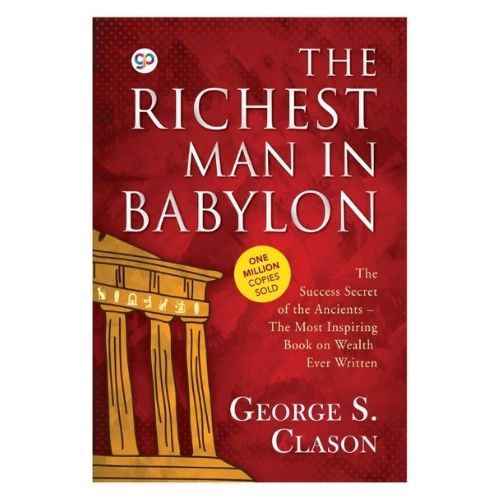
The Richest Man in Babylon by George S. Clason
“A part of all you earn is yours to keep.”
The book you’re referring to is likely The Richest Man in Babylon by George S. Clason. This classic work on financial management imparts timeless lessons through a series of parables set in ancient Babylon. The stories illustrate essential financial principles, such as the importance of saving a portion of your earnings, spending wisely, and investing your money to create additional income streams.
Clason emphasizes the significance of living below your means, seeking advice from those knowledgeable in finance, and making your money work for you. These foundational lessons provide readers with practical guidance for achieving financial prosperity and security.
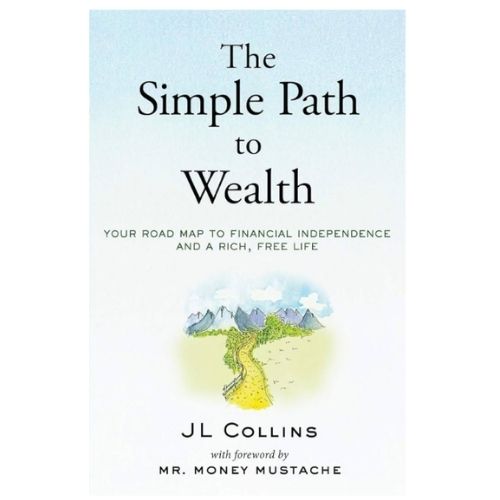
The Simple Path to Wealth by J.L. Collins
“Spend less than you earn – invest the surplus – avoid debt.”
The Simple Path to Wealth offers a comprehensive guide to achieving financial independence. Collins asserts that money is the “most influential tool” and outlines effective strategies for managing it to build wealth. Readers on platforms like Goodreads and Amazon praise the book as a clear resource on investments and portfolio management. It provides practical advice on managing debt, making informed investment decisions, and developing a strong financial mindset.
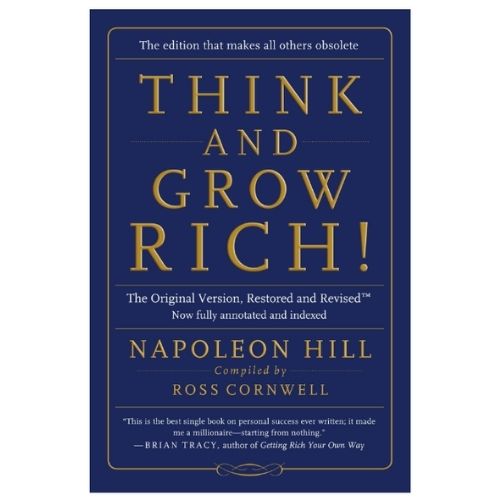
Think and Grow Rich by Napoleon Hill
“Whatever the mind can conceive and believe, it can achieve.”
First released in 1937, this influential book draws inspiration from notable business figures such as Henry Ford and King Gillette. It aims to present principles that lead to financial success. Hill asserts that these principles have contributed to the prosperity of many individuals over the years and can yield financial rewards if you are prepared and have a clear understanding of your goals.
Financial education plays a crucial role in addressing poverty worldwide. Insights from the poorest countries in the world show how a lack of financial knowledge can contribute to long-term economic struggles, making it essential to promote education as a tool for development.
How Books Can Transform Your Approach to Wealth
Books have long served as invaluable resources for financial education and self-improvement. They not only impart knowledge but also inspire and motivate changes in behaviour. Here are five ways reading books can fundamentally alter your approach to building and managing wealth:
Expanding Financial Literacy
Books on finance cover a wide range of topics, from basic money management to complex investment strategies. By engaging with these texts, you can learn the language of finance, understand various financial instruments, and grasp the economic forces at play in the market. This enhanced literacy empowers you to make informed decisions about your money.
Changing Mindsets about Money
Some books focus on the psychological aspects of money, exploring your personal relationship with wealth and the mindset necessary for financial success. These works can help shift your perspective from viewing money merely as a means of transaction to seeing it as a tool for achieving your dreams and securing your future.
Learning from Experts and Successful Figures
Many books are authored by successful investors, entrepreneurs, or financial analysts who share their experiences and insights. Reading these works allows you to learn from their successes and failures, providing a blueprint you can adapt to your own financial journey. This can include everything from Warren Buffett’s investment strategies to the entrepreneurial spirit of Elon Musk.
Encouraging Discipline and Long-term Planning
Financial books often emphasise the importance of discipline, such as regular saving, prudent investing, and effective budget management. They also highlight the value of long-term planning over the pursuit of quick riches. By adopting these practices, you can build a solid financial foundation and steadily work towards wealth accumulation.
Conclusion
The journey to financial success is multifaceted, and the insights provided by these influential books offer readers various approaches to building wealth. Whether through adopting a wealth-focused mindset, learning practical financial strategies, or embracing entrepreneurial opportunities, each book presents valuable principles to guide you towards financial independence. By applying the lessons from these authors, you can gain a better understanding of the keys to managing money, developing long-term wealth, and transforming your financial future.
Frequently Asked Questions
The primary focus of these books is to provide readers with valuable insights into achieving financial success. Each book explores different aspects of wealth-building, including mindset shifts, practical financial strategies, and entrepreneurial approaches. Whether discussing the importance of adopting a millionaire mindset, managing investments, or understanding personal finance through real-life examples, these books aim to guide individuals towards financial independence and long-term wealth management.
Yes, many of the books on this list cater to individuals with little to no background in personal finance. Titles like Rich Dad Poor Dad and The Simple Path to Wealth offer easy-to-understand explanations and practical steps for improving financial literacy. These books introduce key concepts, such as saving, investing, and developing a financial mindset, making them accessible to those just starting their financial journey while also providing deeper insights for more experienced readers.
Several of these books, such as How Rich People Think and Secrets of the Millionaire Mind, emphasise the importance of developing a wealth-focused mindset. They explore how wealthy individuals approach money, challenges, and opportunities, encouraging readers to shift their thinking from scarcity to abundance. By understanding and adopting the habits and mental frameworks of successful individuals, readers can start making more informed and confident financial decisions.
No, while traditional wealth-building methods like saving and investing are important topics in many of these books, they also explore alternative approaches. For instance, The Millionaire Fastlane focuses on entrepreneurial ventures and solving market demands to achieve wealth more quickly. Rich Dad Poor Dad contrasts traditional employment with entrepreneurial thinking, highlighting the benefits of creating multiple streams of income. These books encourage readers to think beyond conventional methods and explore various opportunities for generating wealth.
Yes, many of these books provide practical strategies for long-term financial planning and achieving independence. MONEY Master the Game and The Simple Path to Wealth are particularly focused on helping readers develop structured financial plans, such as creating income streams for retirement and managing investments over time. These books offer clear, actionable steps that guide individuals in taking control of their finances and securing long-term wealth.
Fast, uncomplicated, and trustworthy loan comparisons
At Arcadia Finance, you can compare loan offers from multiple lenders with no obligation and free of charge. Get a clear overview of your options and choose the best deal for you.
Fill out our form today to easily compare interest rates from 19 banks and find the right loan for you.


